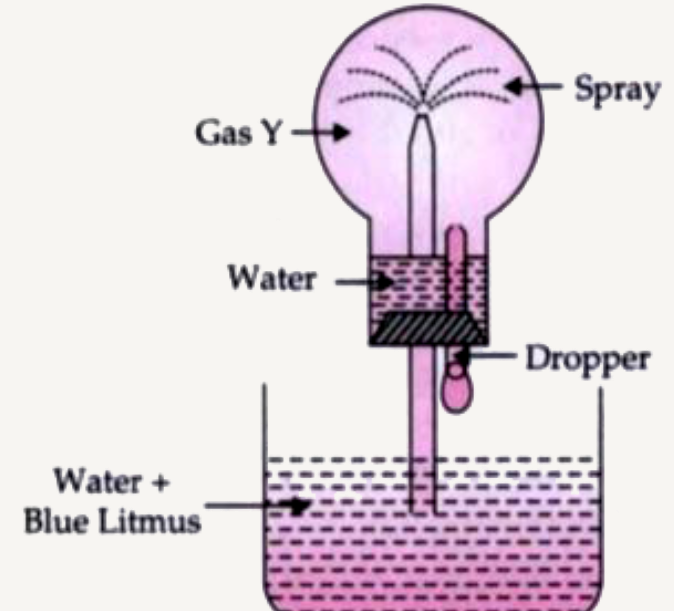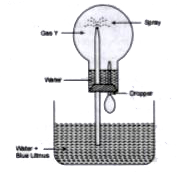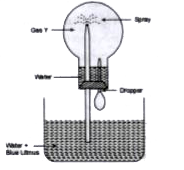Complete Solutions to SECTION-II of chapter CHEMISTRY 2014 of Class 10 book with complete answers and questions
| Class 10 | CHEMISTRY |
| Chapter | CHEMISTRY 2014 |
| GURUKUL PUBLICATION | SECTION-II |
| Number Of Questions | 55 |
| Academic Year | 2023-24 |
State one appropriate observation for the following:
When dilute hydrochloric acid is added to sodium carbonate crystals.
View SolutionState your observation in the following case:
When excess sodium hydroxide is added to calcium nitrate solution.
View SolutionAt the cathode when acidified aqueous copper sulphate solution is electrolysed with copper electrodes .
View SolutionState your observation in the following case: When calcium hydroxide is heated with ammonium chloride crystals.
View SolutionState your observation in the following case :
When moist starch iodide paper is introduced into chlorine gas.
View SolutionStudy the figure given below and answer the question that follow :

Identify the gas Y.
View SolutionStudy the figure given below and answer the questions that follow :

What property of gas Y does this experiment demonstrate ?
View SolutionStudy the figure given below and answer the questions that follow :

Name another gas which has the same property and can be demonstrated through this experiment.
View SolutionName the other ion formed when ammonia dissolves in water.
View SolutionGive one test that can be used to detect the presence of the ion produced.
View SolutionState the conditions required for the following reactions to take place :
(i) Catalytic hydrogenation of ethyne.
(ii) Preparation of ethyne from ethylene dibromide.
View SolutionState the conditions required for the following reactions to take place :
(i) Catalytic hydrogenation of ethyne.
(ii) Preparation of ethyne from ethylene dibromide.
View SolutionState the condition required for the following reaction to take place :
Catalytic oxidation of ammonia to nitric oxide.
View SolutionState the conditions required for the following reaction to take place :
Any two conditions for the conversion of sulphur dioxide to sulphur trioxide.
View SolutionState the main components of the following alloys:
Brass
View SolutionState the main components of the following alloys:
Duralumin
View SolutionState the main components of the following alloys:
Bronze
View SolutionGive balanced equation for the following:
Laboratory preparation of nitric acid.
View SolutionGive balanced equations for the following:
(i) Preparation of ethanol from monochloro ethane and aq. sodium hydroxide.
View SolutionDraw the structural formula for the following compounds :
Ethanol
View SolutionGive the structural formula of the following:
(i) ethanol.
(ii) 1-propanal.
(iii) ethanoic acid.
(iv) 1, 2 dichloroethane.
View SolutionGive the structural formula of the following:
ethanoic acid
View SolutionGive the structural formula of the following:
1,2-dichloroethane.
View SolutionDraw the structure of the stable positive ion formed when an acid dissolves in water.
View SolutionState the inference drawn from the following observation:
On carrying out the flame test with a salt P a brick red flame was obtained. What is the cation in P?
View SolutionState the inference drawn from the following observation:
A gas Q turns moist lead acetate paper silvery black. Identify the gas Q.
View SolutionState the inference drawn from the following observations:
pH of liquid R is 10. What kind of substance is R?
View SolutionState the inference drawn from the following observations :
Salt S is prepared by reacting dilute sulphuric acid with copper oxide. Identify S.
View SolutionName the
The property possessed by metals by which they can be beaten into sheets
View SolutionName the
A compound added to lower the fusion temperature of electrolytic bath in the extraction of aluminium.
View SolutionName the following
An ore of zinc containing its sulphide.
View SolutionGive one equation each to show the following properties of sulphuric acid:
Dehydrating property
View SolutionGive one equation each to show the following properties of sulphuric acid:
Acidic nature
View SolutionGive two balanced reactions of each type to show the following properties of sulphuric acid :
Non-volatile nature
View SolutionGive balanced chemical equation to prepare the following salt:
Lead sulphate from lead carbonate.
View SolutionGive balanced chemical equations to prepare the following salts:
Sodium sulphate using dilute sulphuric acid.
View SolutionGive balanced chemical equation to prepare the following salt:
Copper chloride using copper carbonate.
View SolutionState the Avogadro law of ideal gas
View SolutionA cylinder contains 68 g of ammonia gas at S.T.P.
What is the volume occupied by this gas?
View SolutionA cylinder contains 68 g of ammonia gas at S.T.P.
How many moles of ammonia are present in the cylinder?
View SolutionA cylinder contains 32 g of methane gas at S.T.P. How many molecules of ammonia are present in the cylinder ? [C-12, H-1]
View SolutionWhy do covalent compounds exist as gases, liquids or soft solids ?
View SolutionWhich electrode : anode or cathode is the oxidising electrode ? Why?
View SolutionName the kind of particles present in Sodium Hydroxide solution.
View SolutionName the kind of particles present in Carbonic acid.
View SolutionName the kind of particles present in Sugar solution.
View SolutionAn element Z has atomic number 16. Answer the following questions on Z:
State the period and group to which z belongs.
View SolutionAn element Z has atomic number 16. Answer the following questions on Z:
Is Z a metal or a non-metal ?
View SolutionAn element Z has atomic number 16. Answer the following questions on Z:
State the formula between Z and Hydrogen.
View SolutionAn element Z has atomic number 16. Answer the following questions on Z:
What kind of a compound is this?
View SolutionM is a metal above hydrogen in the activity series and its oxide has the formula `M_(2)O`. This oxide when dissolved in water forms the corresponding hydroxide which is a good conductor of electricity. In the above context answer the following:
What kind of combination exists between M and O?
View SolutionM is a metal above hydrogen in the activity series and its oxide has the formula `M_(2)O`. This oxide when dissolved in water forms the corresponding hydroxide which is a good conductor of electricity. In the above context answer the following:
How many electrons are there in the outermost shell of M
View SolutionM is a metal above hydrogen in the activity series and its oxide has the formula `M_(2)O`. This oxide when dissolved in water forms the corresponding hydroxide which is a good conductor of electricity. In the above context answer the following:
Name the group to which M belongs.
View SolutionM is a metal above hydrogen in the activity series and its oxide has the formula `M_(2)O`. This oxide when dissolved in water forms the corresponding hydroxide which is a good conductor of electricity. In the above context answer the following:
State the reaction taking place at the cathode.
View SolutionM is a metal above hydrogen in the activity series and its oxide has the formula `M_(2)O`. This oxide when dissolved in water forms the corresponding hydroxide which is a good conductor of electricity. In the above context answer the following:
Name the product at the anode.
View Solution
SECTION-II questions and complete solutions for chapter CHEMISTRY 2014 of EVERGREEN CHEMISTRY (ENGLISH) of Class 10